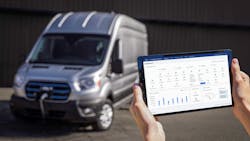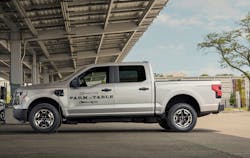Ford Pro Charging launches guide to fleet EV transition
For commercial vehicle users, electrification is more complicated than just figuring out where in the garage to plug in a status-seeking EV. And because CVs are business tools, planning mistakes are much more costly than the money lost on a trade-in. Conversely, the rewards of a thoughtful transition can be much greater than the pleasure of a Sunday drive in the country.
So on Thursday, Ford Pro rolled out its comprehensive solution for commercial EV charging, aimed at helping customers manage their electrification journey. Dubbed Ford Pro Charging, the offering is made up of software and commercial hardware infrastructure to support charging and energy management.
See also: Ford E-Transit gets to work with pilot program fleets
“Customers are saying, ‘We want the E-Transit and F-150 Lightning Pro, but how are we going to charge and operate them efficiently once they’re in our fleet?’” said Ted Cannis, CEO of Ford Pro, a separate business within Ford Motor Co. focused on commercial customers of all sizes. “They are depending on us to provide the electric vehicles and the integrated solutions designed for EVs that they need for charging and connectivity. Ford Pro Charging is an industry-first solution that is focused on helping our customers plan for, operate, and deploy charging solutions so they can reduce operating costs and improve efficiency.”
The “Ford Pro-built, Ford Pro-backed” solution is positioned as an alternative to the otherwise “piecemeal approaches” in the market, as Cannis explained in a media briefing ahead of the public announcement. These require commercial EV customers to rely on vehicle builders, third-party telematics providers, charge management services, and utility companies just to operate the vehicles used in their businesses.
Additionally, Ford Pro Charging and Ford CEVs are “real” and available, he emphasized.
“You're hearing a lot about what other companies might do—and you can't argue with a ‘might,’” Cannis said. “But today what you're going to hear is real end-to-end solutions, live—not vaporware—with real electric vehicles targeted for commercial customers.”
Operational data
Commercial customers will shift to EVs at a rate of 10% to15% per year, Cannis suggested. So knowing that the transition will not be immediate, Ford Pro makes it easier for its 125,000 active U.S. customers to operate their whole fleet and upfits as they add electric versions of the Transit and F-150. The Ford Pro telematics service comes at no charge for the first three years of new vehicle ownership.
So understanding current fleet operations while balancing energy demand gets to the bedrock of the Ford Pro Charging advantage. Data streams from today’s connected Ford commercial vehicles have been leveraged to predict and manage the operational needs of electrified fleets.
See also: Ford touts electric F-150 for fleets
This is what makes Ford Pro Charging a crucial bridge to the future—the software analyzes how each fleet operates and can precisely orchestrate charging management based on those behaviors. Most importantly, the technology solves meaningful problems for customers, such as determining the optimal times to charge based on energy rates.
“Our current fleet of connected vehicles allow us to learn from existing fleet behaviors so we can build the right infrastructure and the right charge-management software,” said Muffi Ghadiali, head of Ford Pro Charging. “Let’s say the customer fleet returns around 10 p.m. planning to go back out starting at 5 a.m. You have a limited window for charging and have to make charging decisions in a highly dynamic environment. Does every vehicle need to be fully charged? Can we balance charge power against the available charging window to take advantage of low overnight energy rates? Ford Pro Charging accounts for a multitude of variables and controls each charge station precisely to optimize energy costs and ensure vehicle uptime.”
Decisions, decisions
Ford Pro Charging aims to be part of every fleet customer’s electrification journey. This starts on day one and continues through every step of the electrification process—identifying available incentives, with Ford Pro consulting on the design and construction of optimal charging sites that can scale with fleet operations, while collaborating with local utility partners on energy and infrastructure needs.
Ford Pro Charging offers a turnkey solution starting with site review and design consultations to determine the number and type of chargers needed, plus service to manage installation of commercial-grade charging hardware.
Ford Pro expects the depot charging industry to grow to nearly 900,000 full-size trucks and vans by 2030. While some fleets need the control and certainty of depot chargers “behind the fence” on company property, others may not have the business model or desire to make an investment in depot charging infrastructure.
See also: Ford Pro offers free fleet telematics for gas and electric commercial vehicles
Ford Pro Charging has them covered, too. Customers have access to over 70,000 public charging ports and growing, including more than 7,300 DC fast charging ports on the nationwide Blue Oval Charging Network. For fleet drivers needing to charge overnight at home, Ford Pro offers a complete solution from home charger installation to software capabilities for tracking, reporting, and simplifying driver reimbursement.
“Customers are in the business of running their own fleet; they are not in the business of building infrastructure, maintaining it and financing it. They're looking at us, saying ‘hey, can you give us a solution?’” Ghadiali said. “There are different sizes of fleets; they have different locations; they have different operational schedules. And that's why we've taken this very consultative approach.
“We have not imposed a solution on them, but we figure out exactly how the fleet operates and then present them with a solution that minimizes their disruption.”
Open standards
Taking an open-standards approach, Ford Pro Charging is designed to interoperate with electric vehicles from a multitude of OEMs and vehicle classes—from forklifts to heavy-duty trucks, the company noted. The software solution enables remote monitoring and management and can relay charge rate, optimal charge times and service alerts.
In conjunction with Ford Pro E-Telematics, exclusive features such as battery pre-conditioning can maximize range and battery performance. Insights and data are integrated in a seamless user experience for fleets, meaning customers can manage their vehicles and fleet operations with a single account that gives them access to the full suite of Ford Pro Charging management and E-Telematics solutions.
About the Author
Kevin Jones
Editor
Kevin has served as editor-in-chief of Trailer/Body Builders magazine since 2017—just the third editor in the magazine’s 60 years. He is also editorial director for Endeavor Business Media’s Commercial Vehicle group, which includes FleetOwner, Bulk Transporter, Refrigerated Transporter, American Trucker, and Fleet Maintenance magazines and websites.
Working from Beaufort, S.C., Kevin has covered trucking and manufacturing for nearly 20 years. His writing and commentary about the trucking industry and, previously, business and government, has been recognized with numerous state, regional, and national journalism awards.




